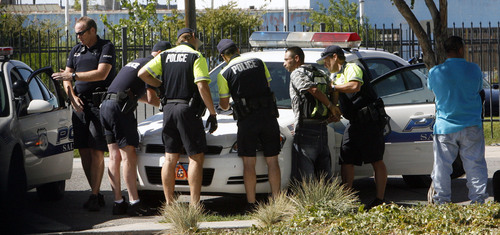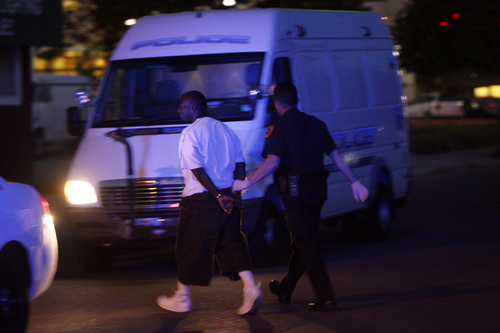This is an archived article that was published on sltrib.com in 2014, and information in the article may be outdated. It is provided only for personal research purposes and may not be reprinted.
Salt Lake City Police Chief Chris Burbank unveiled a plan Tuesday to intensify his department's focus on fighting crime in the Rio Grande Depot district of the city.
His proposal surprised the City Council. It was not part of Mayor Ralph Becker's proposed $58 million police department budget, which the council was reviewing prior to the first of two public hearings on the mayor's overall $229 million plan for 2014-15.
That's because it won't impact the budget, Burbank said. No extra money or personnel are being requested, he added, as the police department reorganizes to put all of the different units working this high-crime district — from bicycle cops and undercover detectives to gang-unit members — under a single, unified command.
"They will be assigned to that area and work exclusively there unless a major incident occurs somewhere else," Burbank said. "It is a presence that will exist 24 hours a day, seven days a week."
Focused attention is needed because this area, the chief said, produces 33 percent of Salt Lake City's crime and 18 percent of all calls handled by the department. The district stretches from North Temple to 700 South between Interstate 15 and State Street.
"This is a problem that [involves] criminals preying not only on the homeless but also on people who work, play and visit that area," Burbank said. "We need to separate criminals from people in the area with good intent."
Although several council members said they would have liked some forewarning of the chief's plan, none objected to its goal.
The main concern was that a crackdown in the Rio Grande district would only drive criminals into other parts of town.
"We can still can adequately cover the rest of the city as appropriate," Burbank pledged.
His proposal received kudos from three speakers at a council budget hearing.
Michael Stransky, president emeritus of GSBS Architects, said the presence of criminal elements around his company's offices at 375 W. 200 South has never been worse.
"The drug dealers own my front steps, they own the intersection in front of my building," he said. "My employees walk through the gauntlet of drug dealers morning, noon and night."
Another businessman from west downtown, Leonard Iversen, pleaded for more patrols at night and on weekends.
"There is a need for concentrated efforts," added Jonathan Harman, director of The Pioneer Park Coalition, whose private and public interests include Rio Grande Cafe, The Road Home, Maverik, St. Vincent de Paul, Crossroads Urban Center and the Downtown Alliance.
A second public hearing will be held June 3 on Becker's budget, which does not increase property taxes, gives employees a 3 percent raise and tries to improve air quality, in part by eliminating city funding for fireworks.
It also proposes to close a fire station near the airport and addresses a $500,000 deficit in the city's golf program.
mikeg@sltrib.com Twitter: @sltribmikeg





